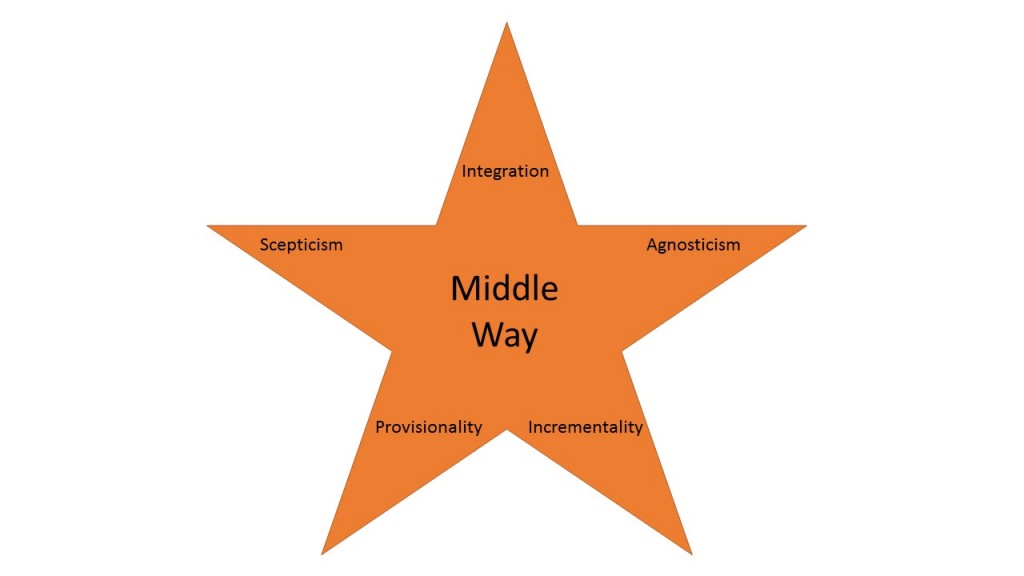I’ve now completed a series of six introductory videos, trying to put the key points of Middle Way Philosophy as simply, briefly and graphically as possible. This has been an interesting challenge, not just to my video-making skills, but also in identifying the key principles which are both basic and distinctive of the Middle Way as I have interpreted it: i.e. in universal terms that are not merely taken from the Buddhist tradition, not dependent on authoritative or metaphysical claims, and applicable to every judgement in our experience, from the most humdrum to the most elevated. It’s with these criteria in mind that I arrived at these 5 principles, which I thought it would be worth writing a bit about here.
The five principles offer a breakdown of what the Middle Way most basically involves and requires, and are as follows:
They are first presented together in the introductory video:
Each of these five principles then becomes the subject of an introductory video in itself. I won’t embed them all here, but you will find them all on the menu above if you hover over ‘Media’ then ‘Middle Way Philosophy Introductory Videos’. All of these videos are 10 minutes or less.
These principles are a basic stripping-down of what Middle Way Philosophy distinctively involves, and they are also aspects of the Middle Way that I generally find absent in other sources about the Middle Way, such as the Buddhist Tradition. Each of them implies and requires the others, so they are interdependent. The Middle Way is the avoidance of positive or negative absolutisation in each judgement. Scepticism tells us why that our basic position is uncertainty and thus why we should avoid ‘truths’ or claims to certainty. Provisionality is the practice of being open to new information in our judgements instead, and incrementality involves recognising that our judgements can be justified when they are a matter of degree rather than absolute. Agnosticism is a further implication of the Middle Way because we need to make an effort to be even-handed in our treatment of absolute beliefs. Integration, lastly but probably most importantly, shows the positive psychological impact of following the Middle Way in resolving both internal and external conflict.
These 5 Principles have to leave an awful lot out, some of which I’ve previously thought to be indispensable. But the process of communicating a synthetic philosophy, I’m discovering, is one of murdering your darlings (as creative writers graphically call it) – letting go of what one previously thought indispensable for the sake of the value and impact of the form one is communicating in. In the videos there is no discussion of embodied meaning, archetypes, science, ethics, religion, objectivity, beauty, authority… and a whole host of other things. However, I do intend to make further videos that will thematically branch out from these basic ones to encompass these other important things. In the videos I have also stripped out any acknowledgement of sources and inspirations, virtually all justificatory argument, and virtually all discussion of the implications. All of these, in the end, can be just clutter if they stop the basic points from coming across.
Lists do seem to be useful to people as portable summaries and aids to memory, which is why there are so many lists in Buddhism. I think this is the right sort of list. It is a kind of unpacking list (as opposed to a packing list) – a list that unpacks basic components from the Middle Way. It’s not a list of ‘truths’: it could be seen as a list of practices, but its focus is judgement. It’s not about what we know, but how we distinctively go about claiming to believe it.

